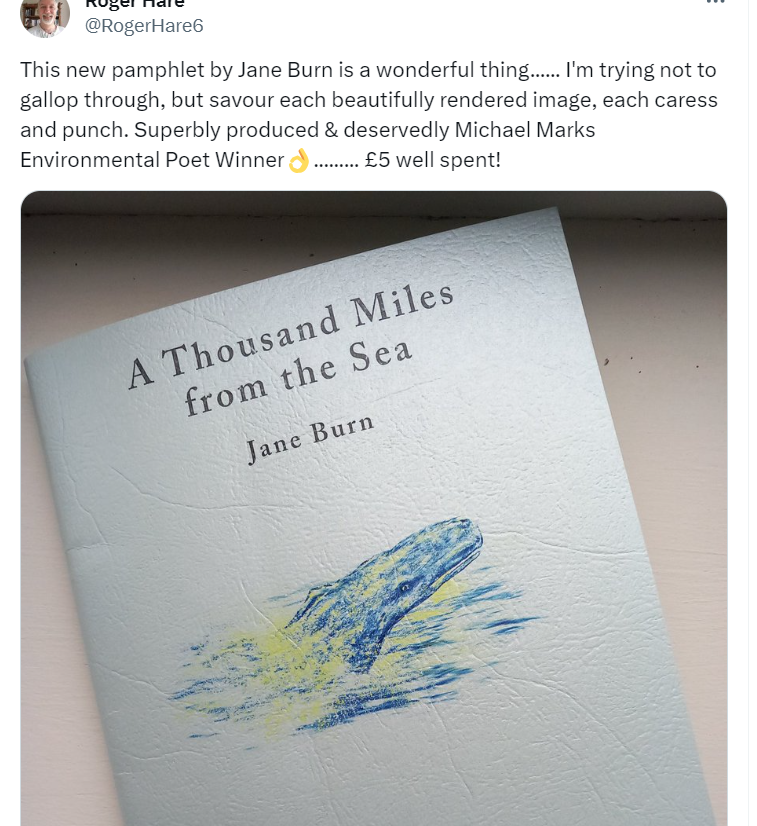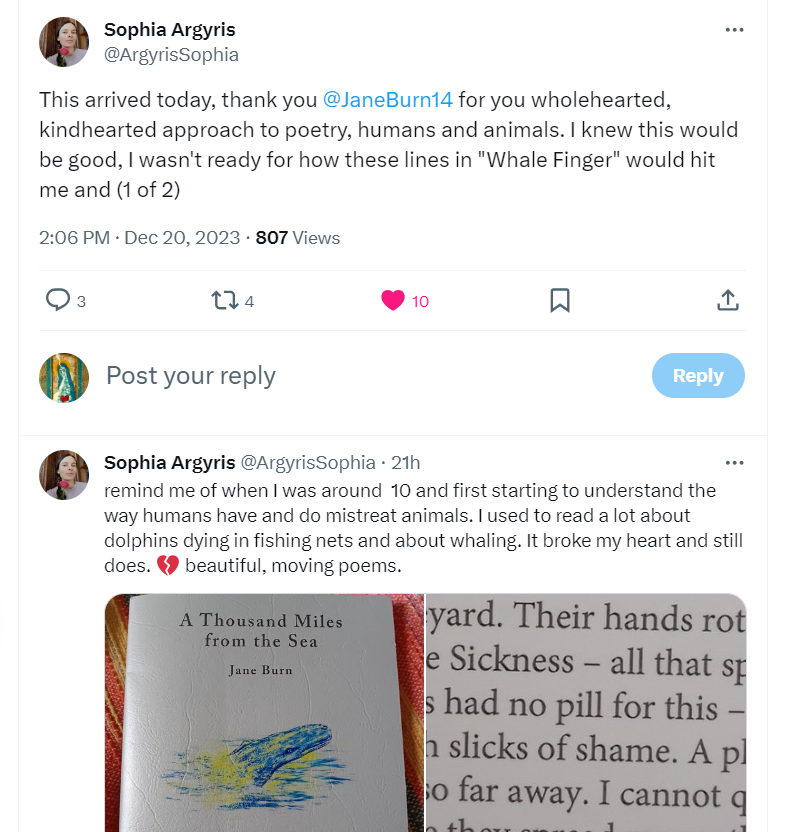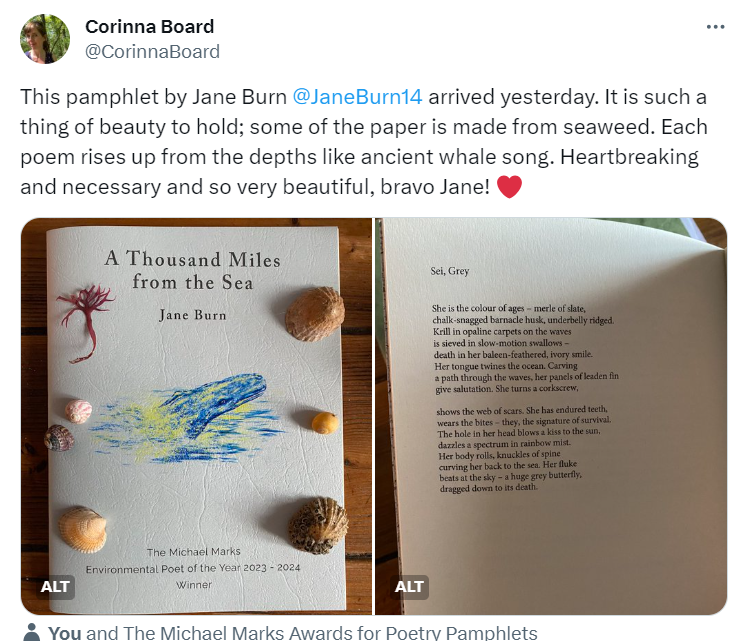
Image description: The main paper colour is light blue and the text is a soft grey/black. There is an illustration of a whale, emerging from the waves in the centre. The wale is blue and the waves are blue. Whale and waves have yellow light reflections.
My portfolio of poems has been chosen by The Michael Marks Awards for Poetry Pamphlets and I have the title of Environmental Poet of the Year, 2023/24.
The pamphlet is available from The British Library and Wordsworth Grasmere, where I will be reading and hosting a workshop in 2024.
Cover image by Lindsey Holland
Here is the text of the speech I made on the awards night.
“A Thousand Miles from the Sea began nine years ago when I was reflecting upon the use of whale imagery in some of my writing. Beauty, power and mystery lend to whales an almost mythical quality. They seem a gift to the poet, and we creative writers are ever adept at harvesting the existence of them be in order to feed the hungriness of our work. How often, I challenged myself, do you think of the deeper existence of those beings? How often do you push your work beyond what is a set of beautiful images ready and waiting to be plundered? Have you thought about what would become of your work if you allowed a deeper level of meaning in? What respect to these creatures ought to be paid?
What and who is whale? With this question in mind, I began to gather details – physical specifics, locations, behaviours, terminology. At a technical level, such details lend your work a verisimilitude it otherwise might not have. The best thing about research is the way it opens out pathways of thought (those fascinating rabbit holes that one can lose hours vanishing, Alice-like down into) – as I progressed with my research, I became deeply affected by the myriad incredible facts to be learned and the amount of stunning footage that documents these phenomenal mammals.
Of course, I knew about the terrible history of whaling but the more I studied it, the more I was awakened to the dreadful truth of human depredation of the cetacean population. I knew that I couldn’t simply aim for my poems to be only beautiful. I had to ask my poems to bridge an important gap between the incredible presence of whales in the world and the devastating legacy of the whaling industry. These poems have become a dialogue, a concatenation between intersections of love and loss, grief and commercial greed, opprobrium and survival, terrene and sea, trauma, and meliorism. I used my poems to negotiate the overwhelming emotions this research gave rise to.
In harvesting imagery from whales to oil the wheels of my writing, I could not help but draw parallels to the oils, flesh, and bones that humankind destroyed thousands of whales for. Their lives were stolen so we could have light; so that we could be clean, fed, and corseted. That is a terrible thought. Many of the poems in this sequence have placed my voice as whale voice – I have spoken through them. With an intention to redress the balance, I have included a poem which is a translation of an actual piece of recorded whale song. I felt the best respect I could pay the whale was to transcribe what I heard as faithfully as possible; to foreground the whale and background the human. To let the whale use me as vessel. To give the whale back its voice.
Humans have been and always will be capable of destruction and of denying their role in the climate emergency. Yet humans maintain the stories that keep vital information about history alive, so that subsequent generations can remain informed about ecological disasters like whaling, and hopefully make the choice to continue the protection of them and the environment in which they live, thus supporting their right to live equally on this Earth. It is my hope that these poems will serve as a catalyst for numerous necessary conversations.
I cannot raise a physical stone monument to the incalculable, climacteric tragedies of whaling, but I felt I could offer these poems as a memorial. To not speak the past, to allow it to be swept beneath time’s rug is to leave the door to future cataclysm ajar. To lament and to reflect upon the loss of so many lives through my poems is something I felt I could do in the hope of further promulgating the narratives which must be kept within the purview of all. To remember is to protect. To not shy away from the words that need to be spoken is love.”
Judges’ Comments
“All three of us thought A Thousand Miles From The Sea a rare and remarkable collection of poems which shows a great capacity for empathy and an impressive command of form. These are tightly-controlled pieces which examine every aspect of whaling, from the human perspective and in the voice of the whale. It is a wholly original pamphlet, packed with brilliant images, visceral and raw, tender and heartfelt. Weather doesn’t just act upon land, it ‘gobbles colour from the walls’. A whale is ‘the colour of ages’. It is impossible to read these poems and not be moved by them.
Both when we were reading individually and during our discussions, we kept returning to this portfolio. We were drawn to its powerful focus on a single subject, which is brought to life through the poet’s use of precise details, their compassion, variety of approach and the obviously extensive research that has gone into this portfolio. We all learnt from these poems, regardless of our previous level of knowledge of the topic, and this aspect too came out in our discussions. We questioned whether the title Environmental Poet of the Year ought to be given based on a collection of poems that focus on just one subject; we decided that absolutely, poetry that has the capacity to haunt each of us, and even to bring us to tears, has the impact that this prize is all about. Importantly, this portfolio carries a message not only of our destructive human behaviours and effects upon the planet, but also of hope. We can change. A Thousand Years from the Sea is remarkable, beautiful, and we can only urge you to read it”.
A note from judge John Aitchison
“I found this portfolio of poems both ambitious and deeply moving.
I have filmed wildlife for television where these poems are set, far away in the whaling grounds of South Georgia, in the South Atlantic. I cried at what people had done there, on the cold shores of the whaling stations at Stromness and Grytviken.
The destruction of the great whales marks one of the lowest points in our relationship with nature. These poems capture the awful ingenuity of our species, inventing ever more powerful tools until we could hunt and dismember the largest animals that have ever lived. The poems bring home the awful banality of their reduction into food for wartime and Lent, into candles and oil to light streets and churches, into soap and margarine.
The poet understands that different priorities drove our behaviour then, and that priorities and people can change; ‘Ah am gone on the Husvik boat’ recognises that whaling was seen as a worthy adventure, and that many men needed the work, but that some changed their minds when they experienced the dreadful reality of slaughtering such great beings.
We must now change how we behave towards all of nature, but dwelling only on the worst that our species has done is not enough to achieve this change; we also need hope and for that we must believe we have agency.
After years of campaigning, the Leith Harbour whaling station on South Georgia was closed in the year I was born. Almost every country has renounced the hunting of whales and their numbers are slowly recovering, but whale oil was replaced by cheap, abundant fossils fuels which have seeped into every corner of our lives. Burning coal, oil and gas is changing the climate and the oceans, driving the great whales back towards extinction, along with so much else.
Now we must bring all our ingenuity to this newest and largest challenge. We must find the same hope and agency that brought an end to the killing of whales. Poetry like A Thousand Miles from the Sea can help us learn from our mistakes. It can help us change”.
Feedback for A Thousand Miles from the Sea:

“This new pamphlet by Jane Burn is a wonderful thing…… I’m trying not to gallop through, but savour each beautifully rendered image, each caress and punch. Superbly produced & deservedly Michael Marks Environmental Poet Winner……… £5 well spent!” Roger Hare

“This arrived today, thank you @JaneBurn14 for you wholehearted, kindhearted approach to poetry, humans and animals. I knew this would be good, I wasn’t ready for how these lines in “Whale Finger” would hit me and remind me of when I was around 10 and first starting to understand the way humans have and do mistreat animals. I used to read a lot about dolphins dying in fishing nets and about whaling. It broke my heart and still does. Beautiful, moving poems.”
“It’s a heart-wrenching, beautiful pamphlet, Jane. Also, it is vividly telling me things I didn’t know. Thank you so much for allowing me to have this precious copy.”
Sarah Wedderburn

This will break and remake your heart in so many ways…’A Thousand Miles from the Sea’ by one of the most talented poets writing (anywhere) today. Jane, your pamphlet takes my breath away! Fierce, empathic, deep pathos. In visceral, altogether transcendent poetry. Julian Day

This pamphlet by Jane Burn arrived yesterday. It is such a thing of beauty to hold; some of the paper is made from seaweed. Each poem rises up from the depths like ancient whale song. Heartbreaking and necessary and so very beautiful, bravo Jane!
Corinna Board

This the first poem in her nine poem collection brought me to tears. Every poem is gold. Love the Whales Song transcription. Reminds me of Les Murray’s transcription of bat song. Paul Brookes